Nick Thomas interview: The king of pantomime explains the secret of his success in his grotto full of puppets
The biggest producer of pantomimes in the world pulls in an average of £28m every season
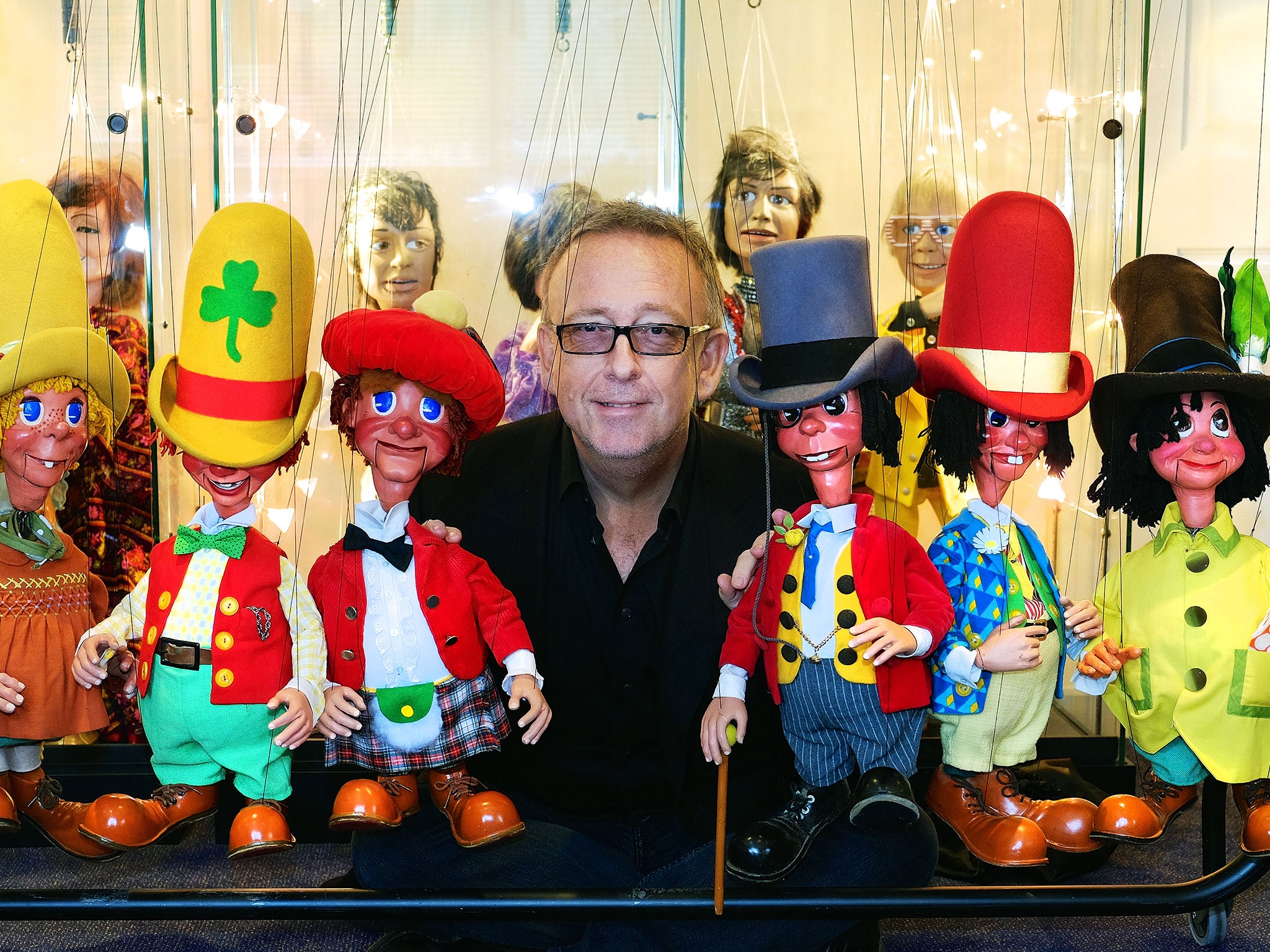
Your support helps us to tell the story
From reproductive rights to climate change to Big Tech, The Independent is on the ground when the story is developing. Whether it's investigating the financials of Elon Musk's pro-Trump PAC or producing our latest documentary, 'The A Word', which shines a light on the American women fighting for reproductive rights, we know how important it is to parse out the facts from the messaging.
At such a critical moment in US history, we need reporters on the ground. Your donation allows us to keep sending journalists to speak to both sides of the story.
The Independent is trusted by Americans across the entire political spectrum. And unlike many other quality news outlets, we choose not to lock Americans out of our reporting and analysis with paywalls. We believe quality journalism should be available to everyone, paid for by those who can afford it.
Your support makes all the difference.On a grey, cold November morning, I stand outside a fairly unprepossessing corrugated-steel unit of a fair size, on the outskirts of Scarborough on the North Yorkshire coast.
It nestles among tool-hire businesses and bulk tile shops, only the presence of a gleaming silver Bentley with a personalised number plate suggesting that there’s anything special here at all.
But special this place is, because inside is such stuff as dreams are made on – and Christmas dreams at that. This is the headquarters of Qdos Entertainment, where the pantos that will delight thousands over the festive season are created. Qdos has been staging pantomimes for 34 years, has 600 productions to its name and is masterminded by one man – the king of the pantos, Nick Thomas.
When he comes to reception to greet me, I am not prepared for the youthful-looking 55-year-old in black shirt, jacket and jeans. I am expecting perhaps some ebullient impresario, some cartoonish ringmaster, an unholy hybrid of a carnival barker, Christopher Biggins and Hi-de-Hi’s Ted Bovis. Thomas looks almost distressingly normal. Can this really be the man behind the biggest pantomime productions in the country?

Then he shows me into his office. Along one side is a clothing rack hung with the original Diddy Men marionettes that accompanied the legendary Ken Dodd on stage in 1965. A cabinet holds not only an original Lord Charles ventriloquist doll, eyes heavily lidded in a perpetually half-cut state, but also an actual Orville the Duck. Closer inspection reveals every corner stuffed with puppets, Thunderbirds and Daleks ranged across the tops of cabinets.
Nick Thomas smiles and raises an eyebrow, and says, “Welcome to my grotto.”
Depending on how far back you dig, pantomime can be said to date to ancient Greece – indeed, the word has Greek roots, roughly translating as “imitate all” – but the English tradition is generally agreed to have begun in 1702 with John Weaver’s show modelled on the Italian commedia dell’arte tradition and using the familiar characters of Harlequin and Scaramouche, which was staged at Drury Lane. Three centuries later and Qdos proudly claims to be “the world’s biggest pantomime producer”.
This year, Qdos is staging 24 pantomimes, from Glasgow to High Wycombe, Bradford to Darlington, Llandudno to Wolverhampton. The farther north you are, the more likely it is that your panto season has already kicked off… Ones in Aberdeen, Belfast, Edinburgh and Newcastle are under way now, with the majority starting their runs in early to mid-December.
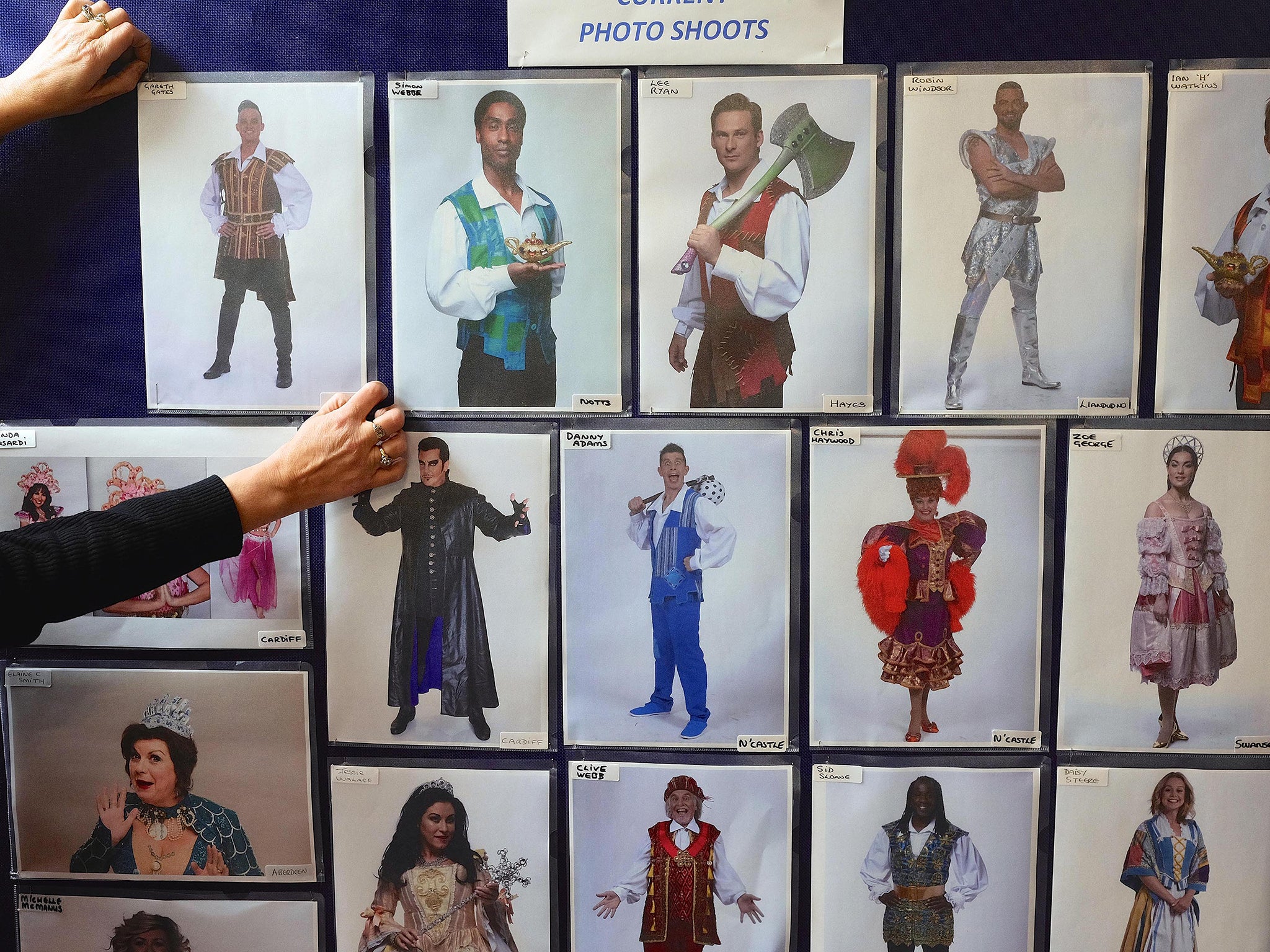
Thomas and his wife, Sandra, will get round pretty much all of them with perhaps just one or two exceptions this year. Their first grandchild was born two years ago, and while panto is one of the cornerstones of the festive season for many of us, Thomas is planning to take a rare week off in the run-up to Christmas.
“I’ll relax at home, with the family,” he says. “Then I’ll get back on the road in early January and get round the rest of them.”
Qdos puts on what you might call classic pantomimes. “Cinderella, Aladdin, Peter Pan, Snow White… These are the popular shows,” says Thomas. “Not that we haven’t tried other things.” His very first panto was Robinson Crusoe in Outer Space at the Charter Theatre, Preston, in 1982. “We’ve had The Wizard of Oz, we’ve done Mother Goose. We’ve even done a show with the Chuckle Brothers called The Chuckles of Oz.” He reflects on that for a moment. “But it’s the traditional shows that people seem to love. They know what they’re getting. Jack and the Beanstalk, Dick Whittington…”
The pantomimes are perhaps a third of Thomas’s Qdos empire – he also owns a string of theatres, puts on cruise shows, and on top of that he’s also branching out into buying and renovating pubs – but at this time of the year, it’s the pantos that dominate. In fact, at any time of the year. For if ever there was a man for whom it was Christmas every day, it’s Nick Thomas.
“I’m thinking about the pantos all year. It invades your thought processes all the time. We already know what pantos are going where next year, for Christmas 2016,” he says. “We also know who’s going to be in them. Not that some of the people themselves know yet…”
Ah, yes, the celebrities. Another great British panto tradition. Old troupers such as Yorkshire comic Billy Pearce, in panto in Bradford for his umpteenth year, rub shoulders with stars of television such as John Challis of Only Fools and Horses, with pop stars such as Marti Pellow, with soap stars such as EastEnders’ Jessie Wallace, with familiar faces plucked from The X Factor and Britain’s Got Talent. Ashleigh and Pudsey the Dog will be gracing the stage in Darlington, and the former Pop Idol heart-throb Gareth Gates is pulling into Crewe on 12 December.
Some of them are old faces who’ve trodden the same boards for decades; others are there for their current recognition factor. Thomas keeps a weather eye open on shows such as I’m a Celebrity... Get Me Out of Here!, which is where he spotted one of his current regular stars.
“In 2007, Christopher Biggins was on,” he says. “I watched it and I knew that he was going to win it. He’d been out of the public eye for a while, but I could tell this was his comeback.” Biggins has been a fixture of Qdos pantos ever since, stepping out in Aladdin in Nottingham this year.
In 2010, even Joan Collins was persuaded to don a rat’s tail and play the evil queen in Dick Whittington in Wolverhampton.
You can’t escape the feeling that whomever Nick Thomas wants, he gets. On the coffee table in his office is the weighty tome of the 2015 edition of Who’s Who. Thomas has been in it since 2013; in The Stage newspaper’s list of the 100 most influential people in British theatre, he’s this year at No 15. Speaking to him you feel he has an instinctive, almost supernatural handle on what works and what doesn’t for a panto audience. Sometimes, of course, a few brave – or foolhardy – theatre managers have tried to have their say.
“I booked Julian Clary for one place some years ago and the manager was worried he was ‘too gay’,” says Thomas, blinking as though he almost disbelieves his own memory. “Then he said perhaps we could get Sooty as well, as though that would make Julian Clary seem less homosexual.” Thomas shakes his head. “Can you imagine Julian with his hand up Sooty on stage? The sort of jokes he’d make about that?”
He reflects for a moment, as though considering the very tiny possibility that sometimes he might get it wrong, then seems to dismiss the idea and confides: “Sometimes we do shows that I personally might think are terrible in terms of my taste… but if the audience disagrees with me and we have a full house every night…” He shrugs in a “what can you do?” sort of way.
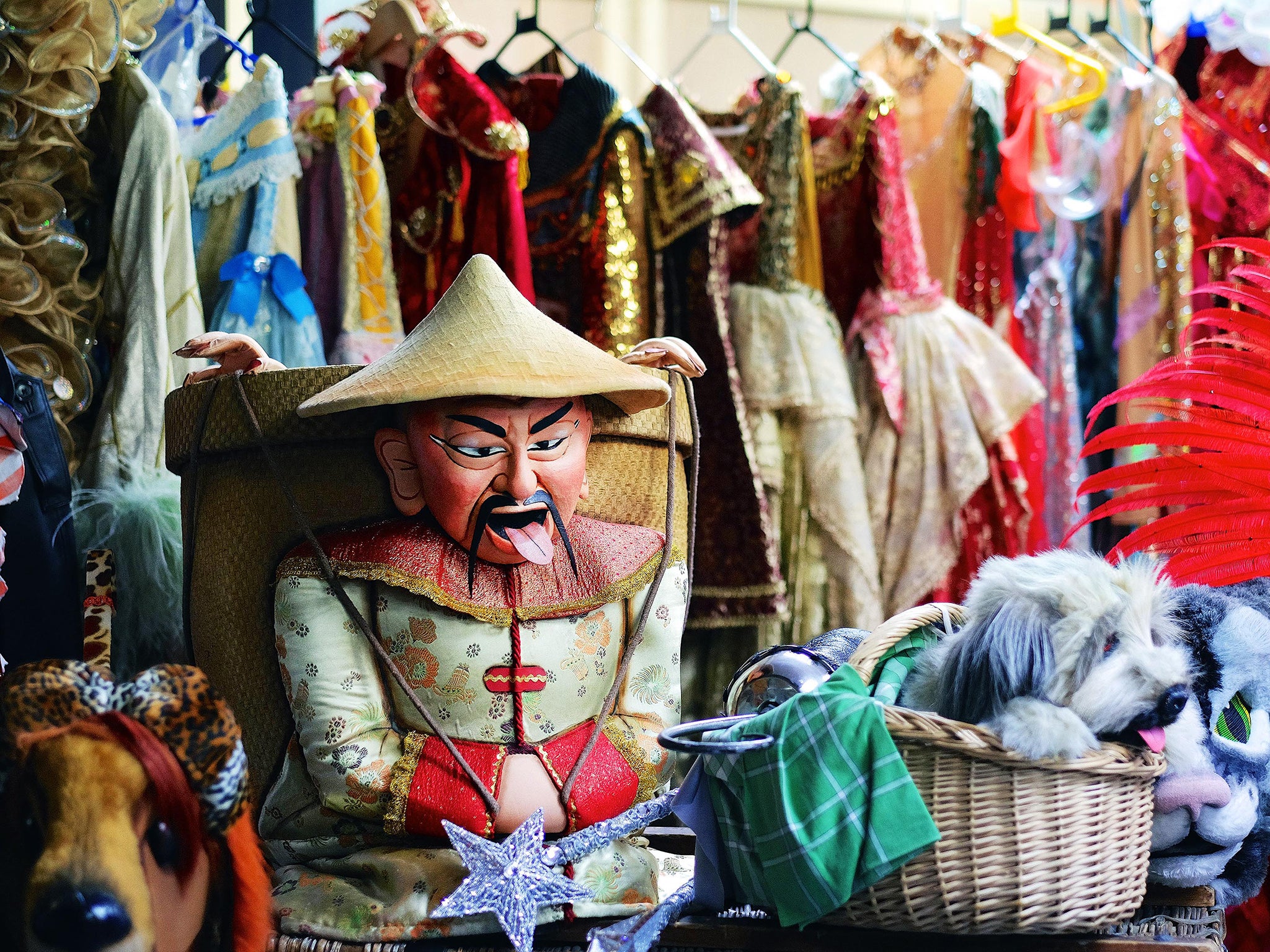
Qdos has an office in London, of course, in the heart of Theatreland on Drury Lane, not far from where that very first panto was staged in the 18th century. Thomas goes to the capital several times a week. (The family home is in Scarborough, but they also have a Covent Garden bolthole.) But it’s in the two northern centres where the military-style operation that keeps 24 pantos going for several weeks each year is currently being managed and rolled out.
In Beverley, East Yorkshire, there’s a massive warehouse where the scenery for the productions is stored. At Scarborough, alongside Thomas’s office, are the costumes. There are something like 150,000 primary-coloured outfits on racks that disappear seemingly into infinity, all under the stewardship of Teresa Nalton, Thomas’s costume manager.
By the loading-bay door is a series of blue wardrobes looking for all the world like a fleet of Tardises. Indeed, they are bigger on the inside than they are on the outside, containing as they do whole worlds of entertainment and fun, bursting to get out. A smaller box is marked “Julian Clary – Dandini Wig” and a metal flight-case has BIGGINS written across it in permanent marker.
“There’s a core team of 12 here,” says Teresa, “and we have costume people at every theatre during the run.”
Teresa’s team is responsible for creating and maintaining the costumes and ensuring they all fit the vast cast of stars and dancers. Do any celebrities perhaps underestimate their waist sizes by an inch or three? Teresa smiles tightly, says nothing and busies herself with the boxes of costumes and props due to be dispatched to Birmingham.
On the mezzanine floor above the loading bay, there is a bunch of Teletubbies costumes, empty and deflated and crushed morosely together on a rack. “We haven’t used those for a while,” says Teresa, following my gaze. “But it’s coming back, isn’t it, Teletubbies? Maybe we’ll use them again next year.”
Thomas leads me through the bowels of the costume department to an equally large room filled purely with shoes and handbags, like an Imelda Marcos fantasy. He points to the rafters and says: “After the panto season has finished, the builders are coming in and creating a mezzanine floor in here, as well. It’s where I’m going to display all my memorabilia.”
Back in his “grotto”, under the watchful painted eyes of the Diddy Men and Lord Charles, Thomas enthuses about his collection, which as well as puppets includes playbills, scripts and posters. But the puppets are especially dear to him: they’re how he got his break on the stage.
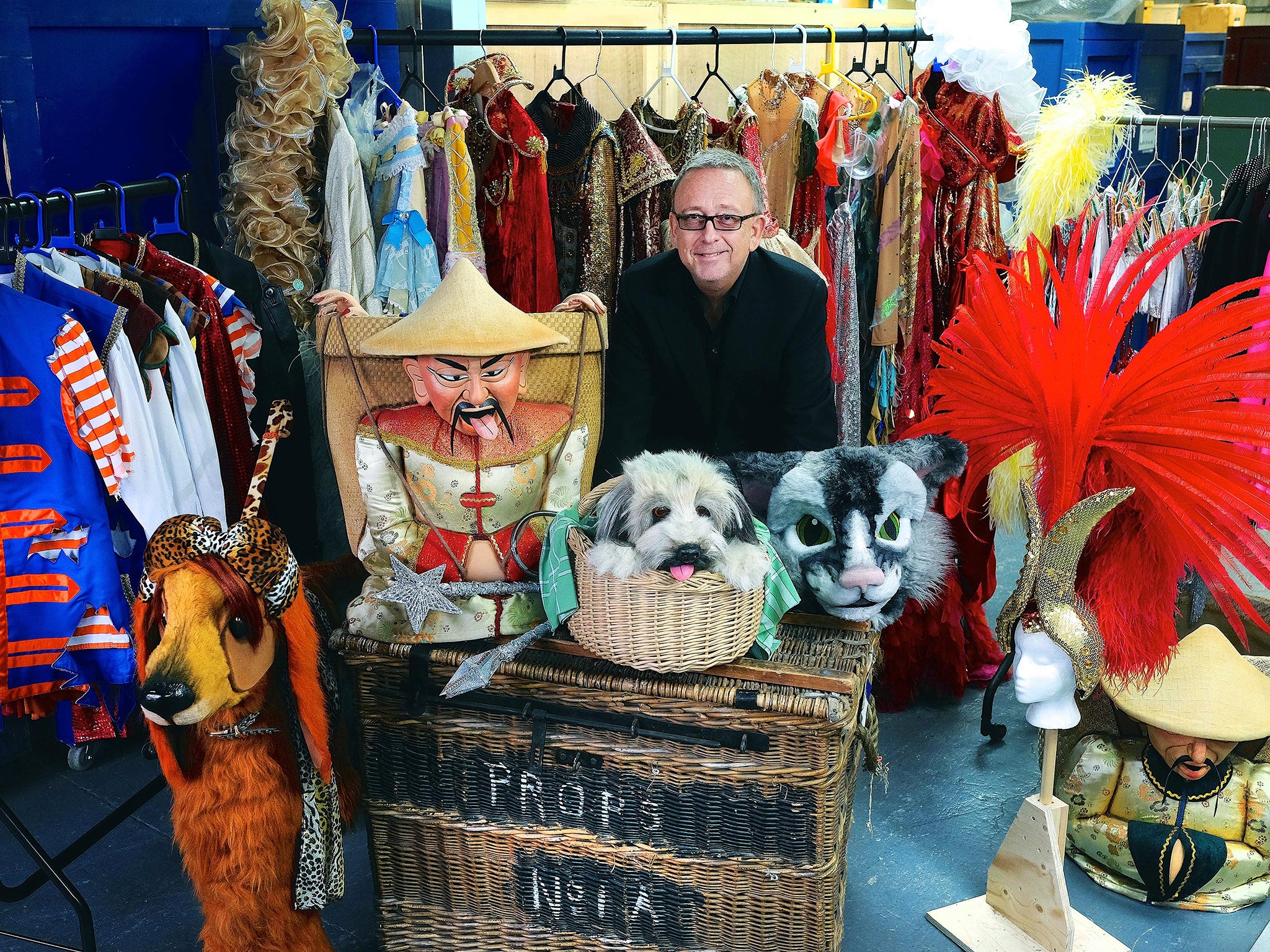
In February 1975, Thomas appeared on the ITV talent show New Faces with his act the Tommer Puppets. He was 15, and had lied about his age – he was a year too young to appear on this proto-Britain’s Got Talent show – but he won his heat and appeared on that series’ Winner’s Show a month later, alongside raw unknown talent including a certain Lenny Henry and the Chuckle Brothers.
Thomas, who had been born in Dorset but whose family had relocated north – first to Southport and then crossing the Pennines to the opposite coast, and Scarborough – knew instantly that he had arrived in the world that had been waiting for him. He left school before sitting his O-levels and embarked on a life of light entertainment.
Thomas has “showbiz” written through him like the sticks of rock they’ll be selling in the Scarborough seafront shops a couple of miles east come spring and the warmer weather. He himself is more pragmatic. “If you cut me in half you’d find I’m a producer… but I’m also a businessman.”
So while he spent those early days performing with the likes of Cilla Black, Dick Emery and the Nolans, he knew he wasn’t going to be doing summer shows with puppets for the rest of his life. In 1981, at the tender age of 21, he got talking to Keith Harris and decided to produce him in a summer show.
“That’s what set me off,” says Thomas, looking at the doe-eyed green bird in a nappy that has pride of place in his office cabinet. “I always say that I owe my start to Orville the Duck.”
Keith Harris died in April this year, after suffering cancer. Thomas cites him and Ken Dodd – still performing at 88 – as the twin forces that galvanised his career. His first visit to a theatre was to the Futurist in Scarborough. In 1970 he met Doddy there, who had on stage with him a troop of children playing his Diddy Men (he’d moved on from the puppets). Thomas couldn’t have known at the age of 10, but one of those Diddy Men – well, women – was a girl called Sandra, who eventually became his wife.
After Robinson Crusoe in Outer Space, Thomas realised he had a thirst – and a talent – for staging pantomimes. That year he started the company which – after acquiring the business of one of its biggest rivals, Paul Elliott, in 1999 – is now in its 34th year of pantos.
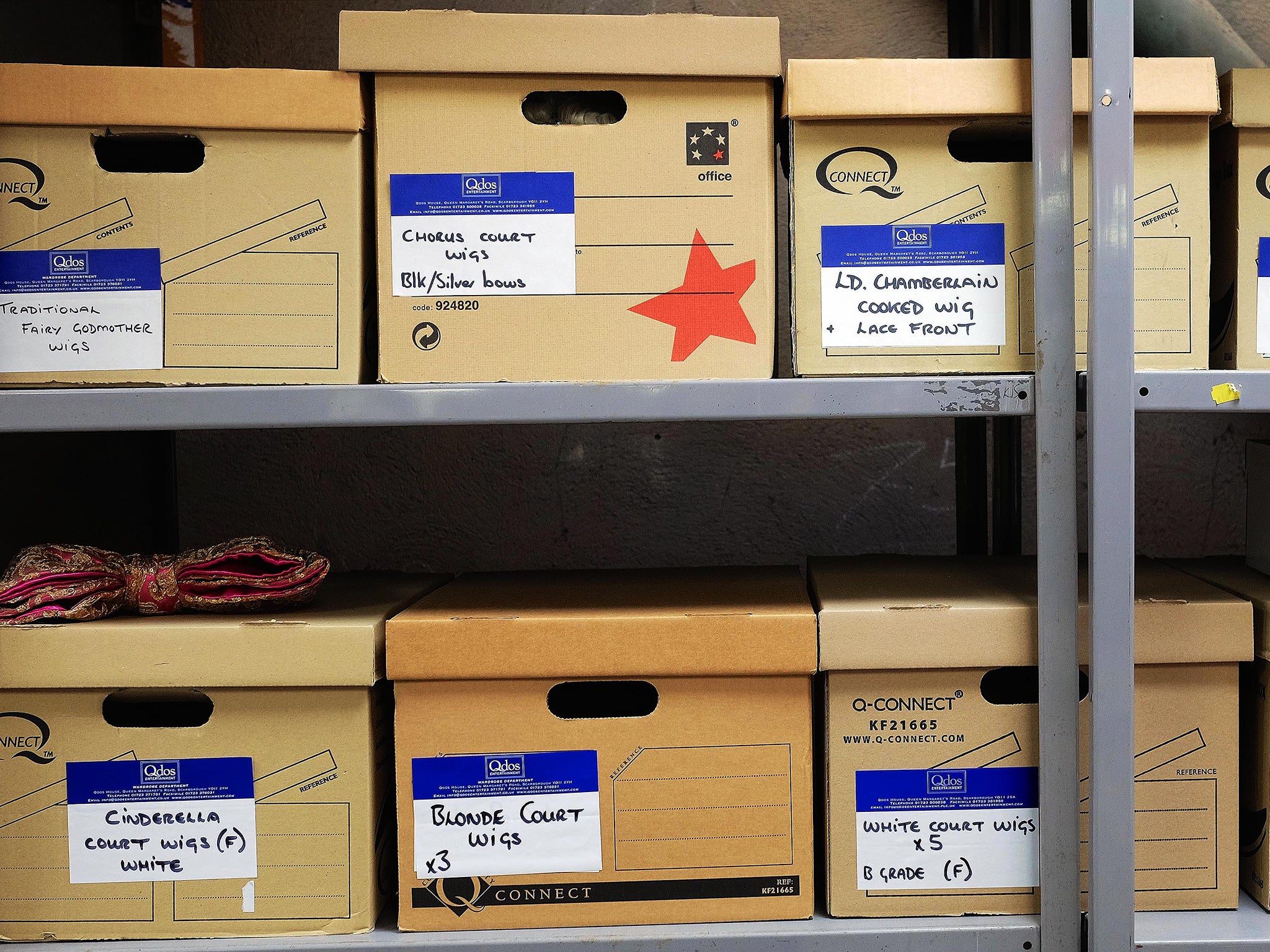
Qdos employs some 1,500 people and while pantomime is only part of the overall business it is, as Thomas points out, “very, very lucrative”. This season, the 24 Qdos pantos across the UK are anticipated to bring in around £28 million. It’s unsurprising that Thomas is regularly pressed to sell some or all of the company.
“I turn down offers to buy one or more elements of the business every year. I’m not interested in just watching money pile up in the bank. What would I do?” He looks momentarily horrified. “Play golf?”
Despite the many, varied and increasing distractions of modern life, panto continues to maintain a fairly strong grip on the British imagination. Thomas has made sure that his productions move with the times – there’s a hi-tech stage effects company called The Twins FX which provides what Thomas cheerfully calls “the clutter” – wow-factor set-pieces such as flying cars, holographic genies, and beanstalks that grow before your eyes.
Because it’s getting kids to sit down in front of a stage, there are sometimes lofty suggestions that panto, as base and slapstick as it is, gives children the theatre-going habit, and is in effect breeding the theatre-goers of the future.
Perhaps surprisingly, Thomas doesn’t whole-heartedly agree with what could be a very nice little justification for panto’s appeal. Instead he says, “I’m not sure I think that at all, to be honest. What I think is that pantomime is what ordinary people want to go and watch at the theatre.
“Some people can get a bit sniffy about pantomime. Anyone who looks down on panto is a twat. What they don’t realise is that I’m in the business of keeping theatres open. The only reason theatres can put on contemporary dance shows and that sort of thing is because the pantomimes bring in so much money and can allow the theatres to afford to put the artsier stuff on.
“People keep coming to pantos,” he says, with a shrug. “They love it. And theatres keep booking us. So we must be doing something right.” He employs a phrase he cheerfully admits he’s borrowed from his Bradford Alhambra mainstay, Billy Pearce. “I’m either very, very good or very, very cheap.”
As to the future… well, next Christmas is already sewn up, so it’s time to start thinking even further ahead. Thomas turns 56 in December, but it’s pointless even asking him if he’s planning to retire. The only future he can see with panto firmly behind him for ever is one where he’s in no position to produce one any more.
“I’ve already got my headstone planned out,” he says, his hand tracing the words in front of him, in – one likes to think – imaginary glowing neon. “Nick Thomas… he knew how to entertain the masses.” µ
Join our commenting forum
Join thought-provoking conversations, follow other Independent readers and see their replies
Comments